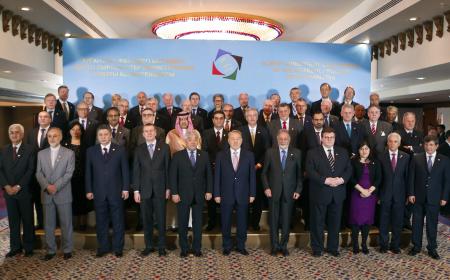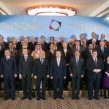
Almaty Hosts ‘Heart of Asia’ Conference
Publication: Eurasia Daily Monitor Volume: 10 Issue: 84
By:

On April 26, Almaty hosted the third Ministerial Conference of the Istanbul Process. Many foreign ministers attended, though some countries, such as the United States, were represented by their deputies. Kazakhstani President Nursultan Nazarbayev keynoted the event, which was co-chaired by Kazakhstani Foreign Minister Erlan Idrissov and his Afghan counterpart, Zalmai Rassoul (Kazinform, April 26).
The “Istanbul Process” is a Eurasian-focused effort to bring peace and prosperity to Afghanistan and its neighbors. Kazakhstani officials have long considered that the best way to achieve stability in Afghanistan was to promote an Afghan-led peace and reconciliation process supported by a favorable regional economic and security environment, with a focus on integrating Afghanistan economically through the development of improved transportation links.
Toward this end, Kazakhstan has joined Turkey and other countries as leading drivers of the so-called “Istanbul Process,” a series of high-level meetings launched in November 2011 in Istanbul to promote regional cooperation in the “Heart of Asia” region, especially between Afghanistan and its neighbors. The process includes Afghanistan, Azerbaijan, China, India, Iran, Kazakhstan, Kyrgyzstan, Pakistan, Russia, Saudi Arabia, Tajikistan, Turkey, Turkmenistan, the United Arab Emirates and Uzbekistan. It is supported by many other countries such as the United States, United Kingdom, France, Germany, Denmark, Canada, Australia, Italy, Norway, Egypt and Iraq, as well as the most influential international organizations.
Earlier ministerial meetings occurred in Istanbul (November 2, 2011) and Kabul (June 14, 2012). The problem with the November 2011 conference was that, while it offered a vision of a harmonious regional security architecture as an effort to enhance mutual trust in the region, the meeting did not provide concrete measures to realize it (https://www.mfa.gov.tr/istanbul-process-on-regional-security-and-cooperation-for-a-secure-and-stable-afghanistan.en.mfa). Although the conference communiqué represented an improvement over the even vaguer 2002 Kabul Declaration on Good Neighborly Relations, it was still primarily a statement of principles and projects without a means to finance them or ensure the commitments were implemented.
The 2012 Kabul conference took a major step toward addressing this weakness by pursuing six clusters of more detailed confidence-building measures in the areas of education, counter-terrorism, counter-narcotics, disaster management, infrastructure, and commercial and trade engagement. The focus was on promoting trust through cooperation beyond traditional security issues, including with political, economic, education, cultural and legal measures.
At the Almaty conference, the delegates adopted another communiqué stressing their support for Afghanistan and goal of promoting greater trust and cooperation in Eurasia. They also adopted concrete implementation (action) plans for each of the six clusters of confidence-building measures (Kazakhstan Ministry of Foreign Affairs, April 26).
In recent weeks, Kazakhstani officials have sought to counter the pervasive pessimism in the region about Afghanistan’s future. Foreign Minister Idrissov cautioned that “this sort of prognosis is a potentially dangerous self-fulfilling prophecy,” which Kazakhstan wanted to dispel by hosting the conference (CNN, April 25). President Nazarbayev delivered the same message at the Eurasian Media Forum in Astana, the day before the Almaty conference (https://uvp.akmol.kz/home/v1, April 25).
In his welcoming address at the latest Istanbul Process ministerial, Nazarbayev argued that the end of the North Atlantic Treaty Organization (NATO) combat mission in Afghanistan should mark a transition to a new international engagement with that country, focused on economic recovery and regional integration, rather than its abandonment. The Afghans need to do their part through enhanced political dialogue and by holding a successful presidential election next year. Although he said that Afghanistan is still a source of regional terrorism and extremist activities, Nazarbayev argued that the international community can help Afghanistan overcome these problems through enhanced assistance. The president then reviewed Kazakhstan’s assistance to the country during the past two decades (Kazinform, April 26; Novosti/Kazakhstan, April 26).
The Process also coincides well with Kazakhstan’s traditional support for greater regional economic and security integration within Eurasia. This has been a longstanding priority of Kazakhstani foreign policy under Nazarbayev that also serves concrete Kazakhstani economic and security goals. The aim is to transform Kazakhstan from a “landlocked” to a “landlinked” country.
Kazakhstan organized several important events on the sidelines of the conference, including a presentation by the mayor of Almaty on the city’s potential to serve as a hub for regional United Nations diplomacy focused on Afghanistan and a seminar on Kazakhstan’s transportation and logistical capabilities (Kazpravda, April 25). Kazakhstani officials noted that the opening of the Kazakhstan-Turkmenistan-Afghanistan railway would provide another conduit for international commerce involving Afghanistan. In addition, they want Kazakhstan’s Aktau port to assume a more prominent regional role as a logistical hub, initially for NATO.
The Istanbul Process consciously aims to support the New Silk Road vision of the United States. It seeks to transform the recently constructed Northern Distribution Network, through which NATO governments send non-lethal supplies to their military contingents in Afghanistan, into enduring enhancements in regional trade links between Central Asia and Afghanistan.
Idrissov said that the Almaty conference participants “feel we must live up to our responsibilities and make the most of this opportunity” (CNN, April 25). That Afghanistan and its neighbors are assuming more of an initiative in addressing the region’s economic and security challenges is a welcome development. The next step would be for more of the participants to make additional concrete pledges, backed by dollar figures, as well as develop some means of enforcement to ensure that all the countries involved fulfill their obligations in the years ahead.




